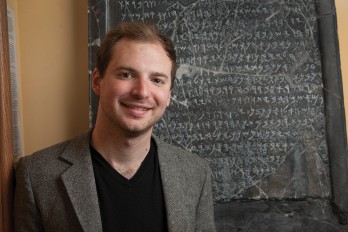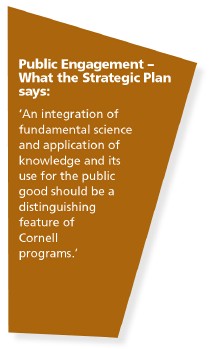COVER STORY SIDEBAR


Maurice Chammah '10 See larger image
During his semester abroad in Cairo, Maurice Chammah '10 heard about an extravagantly wealthy Egyptian student who was expecting a Ferrari for his birthday. That same day, he met a man who fretted about affording the Cairo bus fare, which amounted to 5 American cents.
In the classroom, situations like this are described by terms like "economic stratification." But seeing it up close made these concepts come alive for Chammah.
The College Scholar majoring in Near Eastern studies with an anthropology and government focus says his worldview has been shaped most profoundly by his time in Cairo and a summer in Jerusalem seeing the Israeli-Palestinian conflict up close and personal.
"I see Cornell as a sort of place where you can read, study and really think about all the theories people have put forth, and to think about the complexity of the world," Chammah says. "But to actually go to a place where the complexity of the world is kind of thrown in your face in a way that you have to deal with immediately is something else entirely."
While taking classes at the American University in Cairo, including intensive Arabic language, Chammah researched what would eventually become his senior thesis: the relationship between city sounds in downtown Cairo -- from the buzz of traffic to the traditional call to prayer several times a day -- and how natives related these sounds to secularism and Islam.
The summer after his sophomore year, Chammah spent six weeks working for an Israeli nongovernmental organization called Rabbis for Human Rights, where he wrote reports about problems Palestinians in East Jerusalem and the West Bank were facing due to the Israeli military presence. Some of his reports dealt with families trying to stop impending home demolitions based on new city ordinances. Others involved roadblocks, land seizures and the lack of simple municipal services like trash collection.
"It was simultaneously a feeling of helping, but much more a very intense educational experience, in a very similar way to Cairo, in how everyday life can become so politicized," Chammah says. "Theories that are common about political implications and [the] political stakes of daily issues really come to resonate in a place where the legal status of the land is always up for dispute."
A child of a Jewish-Syrian father and American mother, Chammah was raised "lightly Jewish," and Middle Eastern culture was always around him -- from the music his father listened to to the food his family ate.
But at Cornell his interests solidified. In an ethnomusicology course, Chammah realized that instead of majoring in music, he wanted to be intimately involved with another part of the world. Still keeping a minor in music (he is a violinist), he created his own major centering mainly on Near Eastern studies. Music is always a common theme, though; for example, while in Cairo, he learned to play the Arabic lute.
"The more I thought about the way music exists in the broader world, the more I thought my Cornell education would be helped by putting a foot out into the world, coming back and reassessing it," he says.
